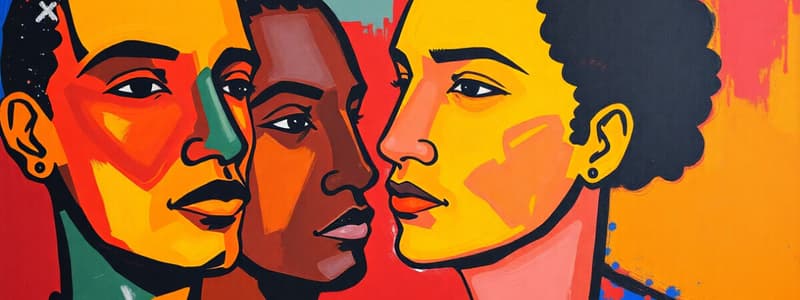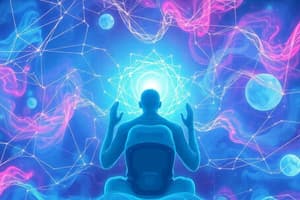Podcast
Questions and Answers
Match the following concepts with their definitions:
Match the following concepts with their definitions:
Revolutionary Pedagogy = Narration in learning causes a lack of understanding Critical Consciousness = Deep understanding of information to apply concepts in real-world Construction of Knowledge = Production of knowledge through social and cultural contexts Diaspora = Dispersal from homeland often by violent forces
Match the authors with their respective works:
Match the authors with their respective works:
Paulo Freire = Pedagogy of the Oppressed Merle Collins = Crick Crack Ruth Hubbard = Fact Making and Feminism Michael Gomez = Antiquity, Chapter 1
Match the myth with its corresponding reality:
Match the myth with its corresponding reality:
Columbus discovered India = Columbus got lost and ended in the Caribbean Women’s biology as a weakness = Societal norms hinder women's education Normal vs. Queer = Deviating from societal norms is labelled as 'queer' Construction of Fact = Fact making is a social enterprise by dominant groups
Match the terms with their significance in education:
Match the terms with their significance in education:
Match the historical perspective to its description:
Match the historical perspective to its description:
Match the term with the element it describes:
Match the term with the element it describes:
Match the educational challenge with its identification:
Match the educational challenge with its identification:
Match the theory with the proponent:
Match the theory with the proponent:
Match the following authors with their works or theories:
Match the following authors with their works or theories:
Match the following terms with their descriptions:
Match the following terms with their descriptions:
Match the following historical contexts with their impacts:
Match the following historical contexts with their impacts:
Match the following identity concepts with their elements:
Match the following identity concepts with their elements:
Match the following influential thinkers with their critiques:
Match the following influential thinkers with their critiques:
Match the following struggles experienced by diasporic communities:
Match the following struggles experienced by diasporic communities:
Match the following aspects of identity:
Match the following aspects of identity:
Match the following forms of oppression and bias:
Match the following forms of oppression and bias:
Match the following elements of the African diaspora:
Match the following elements of the African diaspora:
Flashcards
Diaspora
Diaspora
The dispersal of people and culture who share ancestral origins, often living in different places with varying experiences due to political, environmental, cultural, and social contexts.
Race
Race
A categorization created by white European men. It places whiteness in power to keep others oppressed. Race is a social construct, not a biological reality, and its meaning evolves over time.
Hypo-descent
Hypo-descent
A concept where anyone with even a single ancestor of African descent is classified as Black. This rule reinforces a racial hierarchy and perpetuates the idea of racial purity.
Racial Formation
Racial Formation
Signup and view all the flashcards
Intersectionality
Intersectionality
Signup and view all the flashcards
Heteronormativity
Heteronormativity
Signup and view all the flashcards
Social Construction of Knowledge
Social Construction of Knowledge
Signup and view all the flashcards
Whitening
Whitening
Signup and view all the flashcards
Scientific Racism
Scientific Racism
Signup and view all the flashcards
Industrial Education
Industrial Education
Signup and view all the flashcards
Revolutionary Pedagogy
Revolutionary Pedagogy
Signup and view all the flashcards
Critical Consciousness
Critical Consciousness
Signup and view all the flashcards
Myth vs. Reality
Myth vs. Reality
Signup and view all the flashcards
Construction of Knowledge
Construction of Knowledge
Signup and view all the flashcards
Fact Making
Fact Making
Signup and view all the flashcards
Old World Provenance
Old World Provenance
Signup and view all the flashcards
Framing and Defining Diaspora
Framing and Defining Diaspora
Signup and view all the flashcards
'Queer'
'Queer'
Signup and view all the flashcards
Study Notes
Key Concepts in ADW Final
-
Construction of Knowledge: The social process of creating and understanding information. It's shaped by culture, geography, and community. Crucially, it examines how we know what we know and when we know it. Knowledge is not objective but socially constructed.
-
Revolutionary Pedagogy: A method of education that prioritizes fostering critical consciousness and challenging existing power structures. A crucial element is problem-posing education, contrasting with the "banking" method. Paulo Freire's "Pedagogy of the Oppressed" is a foundational text, arguing that oppressive teaching methods lead to a lack of understanding, preventing students from applying concepts to the real world and limiting expression. Education fostering critical consciousness, liberation, and revolution is crucial.
-
Critical Consciousness: A deep understanding of information enabling effective application in real-world contexts. This goes beyond simply processing information; it involves recognizing the perspectives and biases influencing how knowledge is constructed (e.g., "narration sickness"). Merle Collins' "Crick Crack," analyzes how historical representations shape perspectives.
-
Diaspora: Dispersal of people and culture from a homeland. Often caused by violence or other forces. Diaspora involves a desire for return and a sense of connection to the homeland. Shared struggles and experiences are key characteristics. Examples include the Black Atlantic diaspora and Yoruba culture's impact on Black religions in America. It is both connection and disconnection. Intersectionality considers the various aspects of identity that shape lived experiences (gender, race, ethnicity, sexuality, disability).
-
Identity Formation & Race: The process of becoming who we are. Race is a social construct. Race is a contested, disputed social concept fundamental to American life; it constantly evolves. The social and political system places whiteness in power to keep others oppressed. Concepts like hypo-descent (anyone with Black ancestry is considered Black) are important. "Racial formation" is a key component (per Omni and Winant), showing how race is shaped by social, economic, and political factors. It determines perceptions of human nature (temperament, sexuality, etc.) and creates racial etiquette.
-
Gender, Sexuality, and Identity: Gender is a social construct, interacting with biological sex, sexuality, and identity expression. There are biases and oppression based. Sexuality is about attraction/preferences (physical, romantic, emotional). Labels like heterosexual, homosexual, bisexual, pansexual, and asexual are crucial. Identity is about how we view ourselves and how others perceive us.
-
The Indian Ocean World: A discussion on the experiences of Africans living in India (e.g., Sidis). They face discrimination despite maintaining cultural ties to Africa, demonstrating how identity is complex and multifaceted. Their religion, culture, and music demonstrate the enduring impact of African heritage.
-
The Transatlantic Moment: This explores the harrowing journey of enslaved people across the Atlantic. It highlights the brutal treatment and resistance tactics (such as suicide attempts), demonstrating the lasting impact of the slave trade. The experiences of enslaved people were often marked by violence and suffering.
-
Enslavement: The historical context of the transatlantic slave trade and the enslavement of peoples across the world. Crucial figures include Ida B. Wells, who critiqued the approach of Booker T. Washington, and W. E. B. Du Bois, who examined a sense of African-American identity in the post-emancipation era.
-
Scientific Racism: Examines the racist ideas that were presented as scientific in the post-emancipation era. The movement to "whiten" societies in Latin America is explored, including its cultural and political implications.
Essay Prompts and Additional Notes
- Essays should be written with five paragraphs. Focus on the syllabus starting from Week 2.
- Quote directly or paraphrase source material to back up points.
- Correctly cite the title of works.
- Be sure to cite the contributor or author of the text, for example, Paulo Freire (“Pedagogy of the Oppressed”) not just Freire.
- Utilize examples from the study guide on Canvas.
Studying That Suits You
Use AI to generate personalized quizzes and flashcards to suit your learning preferences.




